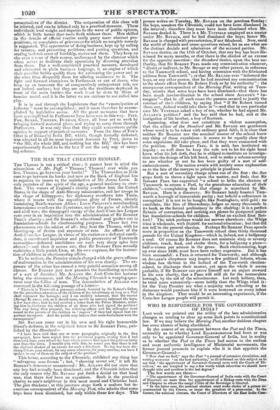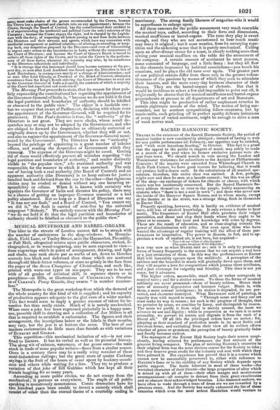WHO IS RESPONSIBLE FOR THE GOVERNMENT OF INDIA?
LAST week we pointed out the utility of the late administrative changes as tending to clear up some dark points in constitutional law. If we may believe the Morning Post, another dubious chapter has some chance of being elucidated. In the course of an argument between the Post and the Times, ostensibly as to whether Lord ELLENBOROUGH had been or was only to be appointed Governor-General of India, but in reality as to whether the Post or the Times had access to the earliest and most authentic intelligence of Ministerial movements, the former journal proceeds to explain who it is that appoints the Governor-General- " Now that we find," says the Post "a journal of extensive circulation, and writing moreover 'on the hest authority,' so ill-informed on this subject as to say that the appointment of Governor-General rests with the Court of Di- rectors,' we are tempted to say a few words which otherwise we should have thought trite and needless in the last degree."
The few words are these-
" The appointment of the Governor-General of India rests with the Court of Directors no more than the appointment of a Bishop rests with the Dean and Chapter to whom the conge d'elire of the Sovereign is directed. " In the latter case, the nominal electors must make choice of a person re- commended by the Crown, or incur the penalties of a premunire. In the former, the nominal electors, the Court of Directors of the East ladle Corn- pany, must make choice of the person recommended by the Crown, because the Crown has a perpetual and absolute veto on any appointment ; because the Crown, through the Board of Control, has the constitutional duty confided to it of superintending the territorial and political (now the only) concerns of the Company ; because the Crown enjoys the right, and is charged by the Legisla- ture with the duty, of inspecting all letters passing to and from India between the Directors and their servants and agents, which have any connexion with territorial management or political relations—of altering, or amending, or keep- ing back, any despatches proposed by the Directors—and even of transmitting in urgent cases orders to the functionaries in India without the concurrence of the Court of Directors ; and because the Court of Queen's Bench is bound to enforce all these rights of the Crown, and to assist the Crown in the perform- ance of all these duties, whenever the necessity may arise, by its mandamus to the Directors collectively and individually. "It is strange that this statement should have become necessary at the pre- sent day, so soon after Lord Auckland was forced upon the Directors in lieu of Lord Heytesbury, in consequence merely of a change of Administration ; and so soon after Lord Glenelg, as President of the Board of Control, obtained a mandamus from the King's Bench ordering the Court of Directors to send out to the Governor-General of India a despatch the contents of which a majority of the Court had repudiated and condemned." The _Morning- Post proceeds to state, that its reason for thus pub- licly expounding the constitutional law regarding the appointment of the Governor-General of India is, "because we do not hold it fit that the legal partition and boundaries of authority should be falsified or obscured to the public view." The object is a laudable one : but we suspect that an act of Parliament, declaring with whom rests the appointment of the Governor-General, will be required for its attainment. If the Post's doctrine is true, the " authority " of the Directors is not great. They are mere clerks, whose scroll de- spatches may or may not be adopted by the Government, and who are obliged to forward the despatches as ultimately corrected or originally drawn up by the Government, whether they will or not, and also to register the appointment of the Governor-General nomi- nated by the Government. The Directors have no " authority " beyond the privilege of appointing to a great number of inferior offices, and reading the despatches of Government which they transmit. The expense of the Directors might be saved. Getting rid of them would effectively prevent all mistakes regarding "the legal partition and boundaries of authority," and render distinctly visible to "the popular view," who exercised authority and was responsible for the manner in which it was exercised. The only use of having both a real authority (the Board of Control) and an apparent authority (the Directors) is to keep suitors for justice bandied back and forward from the one to the other—that righteous claims may be evaded or denied without any one incurring re- sponsibility or odium. When it is known with certainty who appoints the Governor of India and dictates his policy, there may be a chance of getting an improper Governor removed or a bad policy abandoned. But so long as a Board of Directors can say "It was not our fault," and a Board of Control, "You cannot say we did it," the fault is carried off scot-free by the universal scapegoat "Nobody." We entirely concur with the Morning Post: "we do not hold it fit that the legal partition and boundaries of authority should be falsified or obscured to the public view."



























 Previous page
Previous page